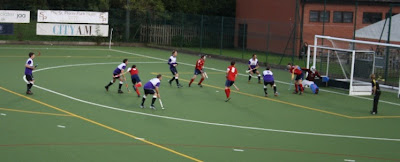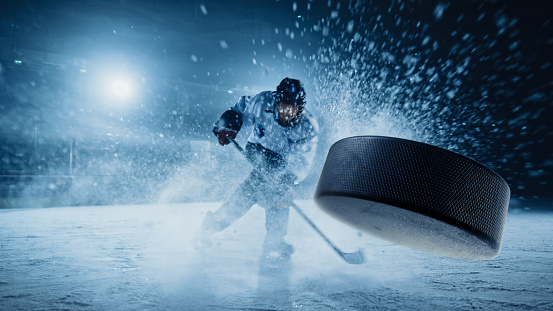But attacking shots at any level in any goal scoring situation is a fundamental part of goalkeeping. If a goalkeeper wants to have better success in save making, then they need to challenge the shooter: it’s goalkeeping 101! And this is an art, along with the save-clear (where the rebound is cleared with distance to prevent a rebound opportunity in close which would be disastrous) that has been almost totally lost and made extinct in say England or Holland perhaps. And this is something that India actually excels at! So this is the groundwork that India’s goalkeepers and their coaches need to work on and draw out, so that they can do better than their peers in this regard, rather than trying to follow a passive style of goalkeeping that doesn’t actually work. And this is a strength that India should base their goalkeeping rebirth on, in developing their own style that can compete incredibly well on the international stage, as demonstrated in the clips from HIL games here:
Challenging like this at short corners is great for stopping shots with the feet and is actually where corner defence is going against low flicks and against strikes so that the goalkeeper doesn’t have to log and move themselves out of the play, so this standout aspect, just needs refining and perfecting for proper use. So in a way, India is actually aware of where the game and therefore, goalkeeping, is going; rightly prophesying the need for the goalkeeper to be upright and react from the feet so that they don’t over commit to a barrier save or move the wrong way only to be deceived and beaten on the other side, with their body weight transferring wrongly and the save therefore impossible. But this also means that the goalkeeper in question needs incredibly strong reflexes and quicksilver reaction times, combined with strong foot/eye co-ordination, if they want to get behind a 100mph strike with their feet, a much smaller blocking surface to use against a high percentage situation.
A goalkeeper in the English national league following the trend India is aware of, reacting from the feet against a low shot on a short corner.
Here you can see how effective it is against low strikes around the backboard height, but the goalkeepers struggle when faced with high drag flicks:
You can see in the following clip how Cortes (Spain’s first choice and arguably in the top three goalkeepers in the world when on form, he got an Olympic silver medal at the age of 26 for starters!) sets up aggressively, but not too far that he makes sure he doesn’t create problems for himself:
The goalkeeper still needs time to react and if they are too far forward, they are making it almost impossible to actually react time with a 100mph flick in 0.03 or so seconds (as is the mathematical calculation for the 16 yard distance). Too far back and they leave too much space for the attacker to shoot (or flick!) into. And if they are facing a high flick versus the intended low coverage, where they need to bring their gloves up and out against a flick to push into and attack and push away properly, they are making life difficult for themselves by not being able to react in this way, as can be highlighted in Adrian’s approach at corners. Poland’s Chyla was made to look silly when he did this, challenging incredibly far out, even further than India’s goalkeepers, as you can see in the clip below. Even though a goalkeeper can appropriately, sometimes they still need to lift off or dive into the save, in order to properly get behind it. It is not always as clear cut as expecting to be able to react from a standing position!
This style is also something you will see in Eastern Europe, where they lack goalie coaches, but still have the instinct to work around their goalkeeper’s natural talents, and learn through playing experience. Belarus’ international first choice, who plays for club Stroitel Brest and has worked on the method that India’s goalkeepers seem to use prevalently on short corners. So perhaps India can learn from this way of doing things, adapting their style (as well as his attacking approach in open play), to involve an attacking goalkeeper and integrate this with a changed defensive system that works with the goalkeeper and their defenders.
If you look at the Dutch goalkeepers and the way they do things in the Hoofdklasse, they are almost do the exact opposite, staying almost literally on the goal line, giving themselves more time (even though it’s milliseconds, it’s still a big difference!) so that they can react with more awareness and use that patience to end up moving in the appropriate counteractive way, then end up diving across too early in the wrong direction and embarrassing themselves! In relation to succeeding either way, it is a case of the right technique for the right situation, ensuring a balancing act wherein the goalkeeper can react within a good time frame and still reach out to make the save, whether from standing or diving out. If the goalkeeper challenges too far, then they cannot react because there is not enough time to, and if too little challenged, they will miss the ball, having exposed more of their goal to shoot into.
But, if you take the fundamental basis of the Indian goalkeeping style, it is often found in its unique brand of attacking style. Happier to rush down short corners as a fifth defender, as in the indoor game, the Indian goalkeeper is much more assertive and attacking with their play. The European game has adapted this style into the “sweeper keeper” role that was started in South American football and is now seen in the modern game, with the evolutionary play of Victor Valdes and his midfield passing abilities at FC Barcelona, or France’s captain Hugo Lloris at AVB’s restructured Tottenham with an incredibly attacking style that eliminates scoring chances even occurring, meaning he has hardly any saves to make.
And it is in this mould that India can reshape itself and its goalies. A lot of world class hockey goalkeepers from Belgium to New Zealand now come out of their D to cut out long passes, made more deadly by the aerial and self pass rule change of last year, getting there before an attacker can latch onto it to score past them. In this way the goalkeeper is able to eliminate a goal scoring threat even happening because it never does! The fundamental part of goalkeeping is to be active within the D, not to passively stand there deep inside your D and expect to spend all your time stopping shots, but to challenge the attacker, especially on breakaways and two on ones or more. It is a goalkeeper who “keeps” their goal and makes sure they defend it, that is the better goalkeeper.
And on the flip side, goalkeeping in India is not as bad as critics sometimes make out; not as haphazard as say that of other international goalkeepers. This “no style style” that often crops up does not work because the goalkeeper is constantly dragged out of position and is a very hit and miss style as the goalkeeper tries to guess where the opponent is going without considering their viewpoint, throwing themselves at the ball, often in the wrong direction or at the wrong time, making it so easy to score on them. The Czech goalkeepers often fall foul to this, looking caught like a deer in the headlights against shooters. Compare that with the clips already shown of India’s goalkeepers that have more grounded fundamentals of basic positioning and angles that are a requirement of any level of goalkeeper, for them to succeed.
As demonstrated in this clip in the play of the Czech’s second choice goalkeeper Martin Hanus, who is athletic and aggressive, but at the same time often over commits and is all over the place sometimes, disadvantaging himself by over thinking, here playing for Italian side HC Bra in the Euro Hockey League:
Feel free to leave your feedback and opinions through the comments section or discuss on Twitter via @Grim_GK. To read more of my writing, especially goalie related analysis, you can check out my blog at http://grimsgoalkeeping.blogspot.co.uk/





